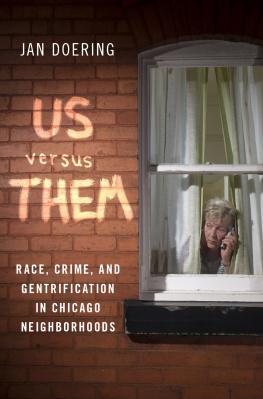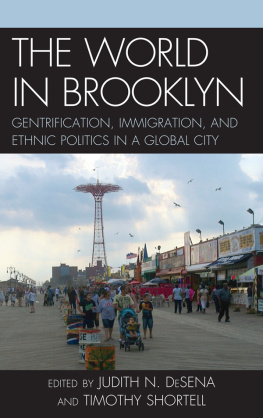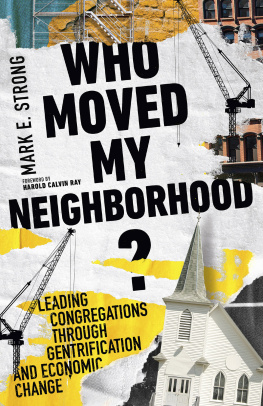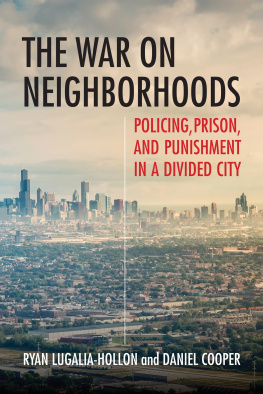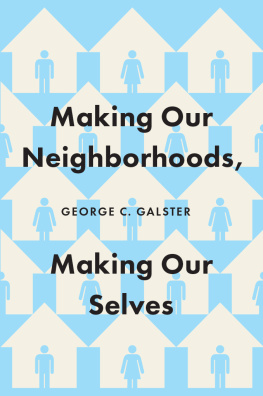Us versus Them

Oxford University Press is a department of the University of Oxford. It furthers the Universitys objective of excellence in research, scholarship, and education by publishing worldwide. Oxford is a registered trade mark of Oxford University Press in the UK and certain other countries.
Published in the United States of America by Oxford University Press
198 Madison Avenue, New York, NY 10016, United States of America.
Oxford University Press 2020
All rights reserved. No part of this publication may be reproduced, stored in a retrieval system, or transmitted, in any form or by any means, without the prior permission in writing of Oxford University Press, or as expressly permitted by law, by license, or under terms agreed with the appropriate reproduction rights organization. Inquiries concerning reproduction outside the scope of the above should be sent to the Rights Department, Oxford University Press, at the address above.
You must not circulate this work in any other form and you must impose this same condition on any acquirer.
CIP data is on file at the Library of Congress
ISBN 9780190066581 (pbk.)
ISBN 9780190066574 (hbk.)
ISBN 9780190066604 (epub.)
Contents
From its early planning stage to the point of publication, this project has taken me ten years to complete. Over those years, I received help from countless people, and I apologize to anyone I may have forgotten to mention here. I conducted the fieldwork for this book as a graduate student at the University of Chicago. There, I enjoyed the singular intellectual experience that this strange institution affords. I am particularly indebted to my doctoral advisor, the inimitable John Levi Martin, whose sincere commitment to scholarly craftsmanship completely changed the way I think. John read and greatly improved practically everything I wrote over the last decade. He was a tireless advocate. And he reminded me of the pleasures of actual intellectual engagement. Thank you! I am also grateful to the additional members of my dissertation committeeNicole Marwell, Kristen Schilt, and Richard Taubwhose profound expertise benefited my work in myriad ways. Furthermore, I gladly acknowledge the support of Andrew Abbott, James Evans, Andreas Glaeser, and Omar McRoberts. And I thank those scholars whose mentorship initially enabled me to pursue a PhD, especially Gnter Albrecht and Kurt Salentin at Bielefeld University.
Among my fellow graduate students in Chicago, I thank first and foremost Jessica Borja, Chad Borkenhagen, Rick Moore, Thomas Swerts, and Christopher Takacstruly encouraging and inspiring friends. During my final years at the University of Chicago, I participated in the Urban Doctoral Fellows Program, led by Joshua Garoon, which permitted me to clarify and develop my ideas. After completing my doctorate, I joined an excellent writing group of University of Chicago graduates: Gordon Douglas and Danielle Raudenbush, as well as Michaela Soyer, who had graciously hosted me during my first academic visit to Chicago and later passed on to me her beautiful Hyde Park apartment when she left town.
My fieldwork and dissertation were supported by a Doctoral Dissertation Research Improvement Grant (SES-1303625) from the National Science Foundation, research grants from the University of Chicagos Center for the Study of Race, Politics, and Culture and the Midwestern Sociological Society, and a Mellon Dissertation Completion Fellowship. While conducting fieldwork, I received precious guidance from Larry Bennett, an expert on all things Uptown, and Wesley Skogan, an expert on everything related to crime and policing. I also got advice from Ellen Berrey and Japonica Brown-Saracino, who had themselves conducted fieldwork on the Far North Side. Furthermore, I had the great fortune of studying Rogers Park at the same time as Florian Sichling, then a student at the University of Chicagos School of Social Service Administration. Florian greatly expanded my understanding of youth and Latino life in Chicago and helped me make sense of my fieldwork experiences as we worked in Andersonville bars and coffee shops.
I thank the study participants from Rogers Park and Uptown for speaking with me and letting me spend time with them. I think that many of them will not like this book very much, because it contains neither the vindications nor the indictments they may have desired. In my defense, I can say that I have done my best to incorporate their viewpoints and experiences without unduly distorting them. If the book elicits a grudging fair enough, I will be happy.
I wrote much of the manuscript as a postdoctoral fellow at the University of Toronto. For making my unusual position there possible in the first place, I thank Richard Florida, whose generous support endowed me with much-needed time for research and writing, as well as access to a Swiss coffee machine. I am also grateful to my ninth-floor colleagues, especially Vass Bednar, Melanie Fasche, Ian Gormely, Michelle Hopgood, and Lauren Jones. Daniel Silver and Zack Taylor taught me much about Toronto and urban politics in general. Clayton Childress and Neda Maghbouleh kindly shared with me the prospectuses of their rightfully celebrated books and were also just very nice to me.
Many scholars have provided me with comments on earlier drafts of chapters in this book. Aside from my dissertation committee, they are Delia Baldassarri, Larry Bennett, Japonica Brown-Saracino, Jeffrey Denis, Laura Doering, David Engel, Robert Eschmann, Corey Fields, Gary Fine, Philip Goodman, Lauren Jones, Rory McVeigh, Andrew Papachristos, Jeffrey Parker, Poulami Roychowdhury, Nitasha Sharma, Eran Shor, Florian Sichling, Daniel Silver, Wesley Skogan, Forrest Stuart, and Thomas Soehl. I humbly thank them all. In addition, I acknowledge the feedback I received from departmental and workshop audiences at the University of Michigans Department of Sociology, the International Center for Comparative Criminology at Universit de Montral, the Social Theory and Evidence Workshop at the University of Chicago, and Northwestern Universitys Ethnography Workshop. Different versions of chapters 4 and 6 were published, respectively, in Social Problems and Sociology of Race and Ethnicity. I thank the reviewers and editors for helping me improve them.
At McGill University, I cherish my fellow faculty members marvelous collegiality and intellectual stimulation. Truly exciting work is happening within these concrete halls. I thank all of my colleagues in the Department of Sociology and especially Sarah Brauner-Otto, Barry Eidlin, Jennifer Elrick, Matthew Lange, Cline LeBourdais, Poulami Roychowdhury, Eran Shor, and Thomas Soehl, as well as John Hall, who helped me complete the manuscript by memorably telling me that the key to publishing a book is just to finish it and then write another one. I suppose his record proves him right. Four excellent (former) McGill studentsToma Itar Beit-Arie, Evan Mancini, Nora Shaalan, and Elise Soulierread the complete manuscript and provided helpful feedback.
I thank all my friends in Jlich, Berlin, Bielefeld, San Diego, Chicago, Toronto, and MontrealI cannot list them all, but they know who they are. Especially my friend Patrick challenged and taught me more than he could possibly know. I am also grateful to my fellow jazz friends, who gave me the opportunity to apply my mind to a very different set of problems and puzzles. I also thank my family. After initially trying to talk me out of majoring in sociology, my parents, Udo and Ulrike, my brother, Ingo, and my cousin, Britta, have consistently expressed unshakable trust in my academic future (Du machst das schon.). I actually found this trust exasperating at first, since it seemed to offhandedly discount the many anxieties and obstacles the academic track entails, but eventually I found great comfort in it. I believe it must have empowered me somehow, because I cannot explain how I made it through in any other way.

